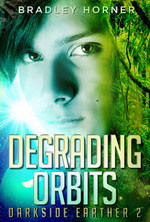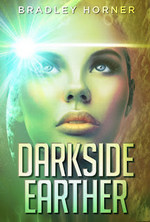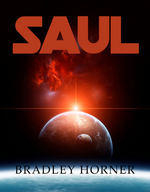 Degrading Orbits
Degrading Orbits
by Bradley Horner
Series: Darkside Earther, #2Kindle Edition, 225 pg.
2018
Read: November 12 – 13, 2018

So, in each of the three books by Horner that I’ve read, he throws his readers deep into a technologically-enhanced future that requires a very specialized vocabulary. The books are chock full of what I’ll be calling SF hooptedoodle, which is cool — it can be intimidating at times, it can be overwhelming at times, but it suits his fiction well. Now, in Darkside Earther (this book’s predecessor), Horner told a sweet teen love story surrounded by SF hooptedoodle. Degrading Orbits, on the other hand, frequently feels like a swamp of SF hooptedoodle with a little bit of a human story here and there.
This is all about the fallout from the climatic events from Darkside Earther, how Axel’s parents are trying to save him, the Ring, and their careers (not necessarily in that order). They do this by putting Axel under the care of a security team to protect, heal and train him into being what his parents need him to be.
The biggest part of this protection and training takes the form of cutting off all communication with Helen and the rest of his friends and former life. Axel obviously doesn’t want this, but is unable to do anything else.
Thankfully, Helen, his friends and the large gaming community they’re part of are busy trying to hack into his brain — among other things. We don’t get to see most of what they’re up to, but we do get to hear summaries of it in the brief moments that Axel and Helen get to spend communicating. And it sounds very promising.
My biggest problem with this book is that Helen and Axel have practically zero agency — what they do has almost no impact at all on the events of this novel. And the events of the novel aren’t affected all that much (with one exception) by anything Axel does. Now, it’s pretty clear that what they did do in this novel will have huge impact on what’s to come. But here it was less useful than using a piece of crabgrass to pick a deadbolt. I know that’s how things have to go sometimes, but it’s more than frustrating in a novel.
I liked these characters going in and was looking forward to seeing how they recovered from the previous book. So I was a little disappointed in this one, but I do have every confidence that this was necessary to set up a great finale. I’m looking forward to being proven right. In the meantime, I had enough fun watching Axel get put through his paces and Helen trying to save the day. I even enjoyed trying to suss out what was going on with the SF hooptedoodle.
In the end, while this didn’t work for me as much as I wanted it to, I still enjoyed it and am looking forward to seeing how Horner wraps up this trilogy — I’m sure that this book set up things for that conclusion in such a way that the things that I wasn’t crazy about in Degrading Orbits won’t be as prominent in it. It’s a good book, even with my quibbles — but it could’ve been a little better.
—–






